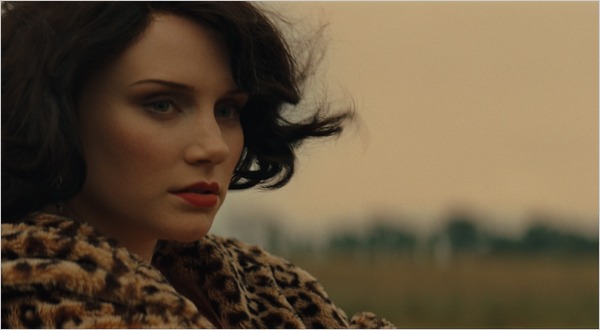|
Reviews of Recent Independent, Foreign, & Documentary Films in Theaters and DVD/Home Video

THE LOSS OF A TEARDROP DIAMOND The Loss of a Teardrop Diamond is an excellent example of how a number of elements, which are only slightly unusual, can interact to create a rather bizarre piece of cinema. Written in the late 1950s by Tennessee Williams, Teardrop Diamond was lost in the shuffle between other projects. Elia Kazan, the director Williams had teamed up with on A Streetcar Named Desire and Baby Doll, was slated to direct but got caught up in other films, and Williams became busy adapting Suddenly, Last Summer with Gore Vidal. Just like one might drop some change in between cushions of the couch, the screenplay fell into a dark corner until director Jodie Markell, a Williams enthusiast, decided to finally make it. One of the reasons why the screenplay may never have been made 50 years ago is that it is constructed rather strangely. The plot itself is slight. Fisher Williams (Bryce Dallas Howard) is brought home from Europe to Memphis at the behest of her spinster aunt, who has threatened to cut her off from the family fortune if she doesn’t comply. Due to her father’s actions, which have hurt a number of people, she is an outcast, and thus hires an acquaintance, Jimmy Dobyne (Chris Evans), to escort her to a number of debutante balls. Fisher, for no reason apparent, eventually falls for James, who rejects her, also for no apparent reason. The script shares one of those peculiarities of older films: a Hays Code politeness that can be taken either for demureness, psychological complexity, or confusion. As character motivations are handled through telling and not showing, as well as through heavy-handed symbolism, the film doesn’t offers psychological complexity. Williams is too talented a writer to merely be confused, so the spirit of the times speaks through, and we can never really understand the characters because the time period Teardrop Diamond was written in only allows us certain glimpses of how and why they behave. Is James, like many of Williams’ male protagonists, a closeted homosexual, who therefore rejects Fisher because he’s simply not attracted to her? Does he reject her because of class differences? Is it really because their relationship started out as transactional? There’s not enough information to truly support any of these possibilities, and thus, there is a mass of confused and confusing character motivations. Adding to the strangeness, the latter half of the film takes place in one single location, which creates a static feeling. This motionlessness and the character confusion interact to create a very weird experience. Feeding
into that peculiar feel are the different temporal lenses Teardrop
Diamond is filtered through: a movie written in the late ’50s about
the 1920s filmed in the aughts. Thus, the ’20s are distilled through two
different time periods in two different ways: a post-war look at that
decade written for an audience on the cusp of great social change, now filtered through a half century of cinema. This produces
extremely odd incongruities, such as a psychedelic drug sequence after
Fisher takes some opium, a sequence that could have never taken place if
Teardrop Diamond had been filmed when originally intended.
Nothing on its own makes this a weird film, but
all of these components occurring at once is too much, and no matter how
good the acting is or how beautiful some of the shots are can overpower
that strangeness.
Andrew Beckerman
|

